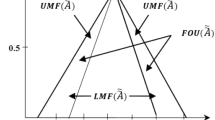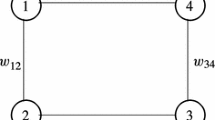Abstract
In this paper the minimum spanning tree problem in a given connected graph is considered. It is assumed that the edge costs are not precisely known and they are specified as fuzzy intervals. Possibility theory is applied to characterize the optimality of edges of the graph and to choose a spanning tree under fuzzy costs.
Similar content being viewed by others
References
Ahuja R.K., Magnanti T.L. and Orlin J.B. (1993). Network flows, theory, algorithms and applications. Prentice Hall, New Jersey
Aron, I., & van Hentenryck, P. (2002). A constraint satisfaction approach to the robust spanning tree problem with interval data. In Proceedings of the 18 Conference on Uncertainty in Artificial Intelligence, Edmonton, Canada, pp 18–25.
Aron I., van Hentenryck and P. (2004). On the complexity of the robust spanning tree problem with interval data. Operation Research Letters 32(1): 36–40
Averbakh I. and Lebedev V. (2004). Interval data mminmax regret network optimization problems. Discrete Applied Mathematics 138(3): 289–301
Chanas S. and Zieliński P. (2001). Critical path analysis in the network with fuzzy activity times. Fuzzy Sets and Systems 122(2): 195–204
Chanas S. and Zieliński P. (2002). The computational complexity of the criticality problems in a network with interval activity times. European Journal of Operational Research 136: 541–550
Chanas S., Dubois D. and Zieliński P. (2002). On the sure criticality of tasks in activity networks with imprecise durations. IEEE Transactions on Systems, Man, and Cybernetics - Part B: Cybernetics 32: 393–407
Dubois D. and Prade H. (1988). Possibility theory: An approach to computerized processing of uncertainty. Plenum Press, New York
Dubois D., Fargier H. and Fortemps P. (2003). Fuzzy scheduling: Modelling flexible constraints vs. coping with incomplete knowledge. European Journal of Operational Research 147(2): 231–252
Kasperski A. and Zieliński P. (2006). An approximation algorithm for interval data minmax regret combinatorial optimization problems. Information Processing Letters 97(5): 177–180
Kasperski A. and Zieliński P. (2007a). On combinatorial optimization problems on matroids with uncertain weights. European Journal of Operational Research 177(2): 851–864
Kasperski A. and Zieliński P. (2007b). Using gradual numbers for solving fuzzy-valued combinatorial optimization problems. Lecture Notes in Artificial Intelligence 4529: 656–665
Kouvelis C. and Yu G. (1997). Robust discrete optimization and its applications. Kluwer Academic Publishers, Boston
Montemanni R. and Gambardella L.M. (2005). A branch and bound algorithm for the robust spanning tree problem with interval data. European Journal of Operational Research 161(3): 771–779
Papadimitriou C., Steiglitz K. (1998). Combinatorial optimization, algorithms and complexity. Mineola, New York: Dover Publications Inc.
Yaman H., Karaşan O.E. and Pinar M.C. (2001). The robust spanning tree problem with interval data. Operations Research Letters 29(1): 31–40
Author information
Authors and Affiliations
Corresponding author
Rights and permissions
About this article
Cite this article
Janiak, A., Kasperski, A. The minimum spanning tree problem with fuzzy costs. Fuzzy Optim Decis Making 7, 105–118 (2008). https://doi.org/10.1007/s10700-008-9030-5
Published:
Issue Date:
DOI: https://doi.org/10.1007/s10700-008-9030-5




